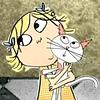You need to sign in or sign up before continuing.
Take a photo of a barcode or cover
The book follows Yeong-hye, a very ordinary South Korean woman who decides she must stop eating meat following a series of disturbing dreams. This decision creates a domino effect that begins with rebellion, societal rejection, and ultimately, mental collapse.
Kang shares Yeong-hye's story from the perspectives of three people - her husband, her brother-in-law, and her sister. She never shares Yeong-hye's own thoughts on her situation which, in my opinion, makes her even more of an enigma. The ambiguity surrounding her only deepens as the book progresses. The more I read the book, the more I felt like Yeong-hye’s vegetarianism was less about food and more about rejecting the norms that she was always forced to accept. It is her act of defiance that leads to a chain reaction of horrors inflicted by those around her, as if society needed to punish her rebellion whilst absolving itself of responsibility for her suffering
At times, the book can be hard to read, especially when her husband and brother-in-law objectify Yeong-hye and subject her to cruelty. However, it is those tough parts of the book that force you to acknowledge the harsh reality of a society that dehumanizes anyone who dares to deviate from its rules. Through Yeong-hye’s story, Kang paints a damning portrait of a world where those who don’t conform are cast aside, stripped of dignity, and treated as less than human.
This book is a powerful allegory, open to different interpretations. I interpreted it as a piece on autonomy, the oppressive nature of societal expectations, and the cost of nonconformity. I’m also curious to read more reviews and see how others interpret the story.
Graphic: Rape, Self harm, Sexual assault, Sexual content, Suicide attempt
Graphic: Domestic abuse, Emotional abuse, Mental illness, Physical abuse, Rape, Sexual assault, Blood, Suicide attempt
Graphic: Child abuse, Emotional abuse, Mental illness, Physical abuse, Sexual assault, Sexual violence, Forced institutionalization, Medical content, Medical trauma, Suicide attempt
Kang took a pretty interesting direction with In-hye that I personally hadn’t seen much when I first read this book in 2022. Often, the “perfect older sister” trope falls into the chracter admonishing her siblings and parents for forcing her into the role while she remains dependent on societal norms, and while In-hye does hold resentment she also holds an understanding of her sister and the life that <i>she</i> was forced to live. They are a lot more similar than realized throughout the first two parts. In-hye recounting her own dreams that have begun plaguing her and how she finds more comfort in the mental wards than she does outside bring her closer to her sister in what is presumably her final moments. I greatly appreciate that her reliance on her son is not framed as motherhood bringing her happiness, but instead that the familiarity of parenting (which she was conditioned into from a young age) brings her comfort when everything around her has become uncertain.
Graphic: Animal cruelty, Physical abuse, Sexual assault, Blood
Moderate: Animal death, Rape, Suicidal thoughts, Suicide attempt, Schizophrenia/Psychosis
Minor: Forced institutionalization, Vomit
Moderate: Animal cruelty, Eating disorder, Mental illness, Rape, Self harm, Sexual assault, Sexual violence, Medical content, Medical trauma, Suicide attempt, Schizophrenia/Psychosis
Graphic: Eating disorder
Moderate: Domestic abuse, Physical abuse, Sexual assault, Suicide attempt
Minor: Vomit
The Vegetarian- 3.5/5
I don't even know what to say about this one. the wife definitely has a mental illness, but with her husband and her family I'm not surprised she ended up this way? You kinda of have to infere what caused her to spiral, but if you have any idea what's it's like to be a woman in Korea I'm afraid it's not that difficult to imagine. I was absolutely shocked and disgusted when her husband (the narrator) described her as a comfort woman and him, and Japanese soldier.
Mongolian Mark 2/5
oh this one was sicker than the previous one
Flaming Trees 4/5
As an eldest daughter, I thought Inhye's perspective was enlightening. I don't know really what to feel except my chest feels stuffy? This entire work was unsettling, but the 3rd short resonated with me the most and I thought it was a fitting conclusion to wrap the entire message of the collection.
When a person undergoes such a drastic transformation, there's simply nothing anyone else can do but sit back and let them get on with it.
Graphic: Animal cruelty, Animal death, Body horror, Body shaming, Child abuse, Confinement, Death, Domestic abuse, Eating disorder, Emotional abuse, Gore, Infidelity, Mental illness, Miscarriage, Misogyny, Physical abuse, Rape, Self harm, Sexism, Sexual assault, Sexual content, Sexual violence, Terminal illness, Toxic relationship, Violence, Forced institutionalization, Blood, Vomit, Medical content, Suicide attempt, Sexual harassment, Injury/Injury detail
Moderate: Cannibalism
Graphic: Body horror, Eating disorder, Self harm, Sexual assault, Suicidal thoughts, Violence, Blood, Suicide attempt, Injury/Injury detail
And I can only assume that the reviewer on the book jacket who compared this to Kafka doesn't understand that cultural norms vary between cultures. This wasn't Kafkaeqsue at all....
Graphic: Eating disorder, Infidelity, Mental illness, Misogyny, Self harm, Sexism, Sexual assault, Forced institutionalization, Medical content, Medical trauma, Schizophrenia/Psychosis
Moderate: Misogyny, Rape
Minor: Child abuse
However, I don’t think I ‘enjoyed’ it. But was this book written to be enjoyed?
I found it difficult to connect to any of the characters, but I think this was purposeful. I found the pacing quite off and confusing, which dampened my reading experience.
Overall, I have no idea what to rate this book, but I’m glad that I read it, and have a lot to chew on…
Graphic: Mental illness, Rape, Self harm, Sexual assault, Schizophrenia/Psychosis






